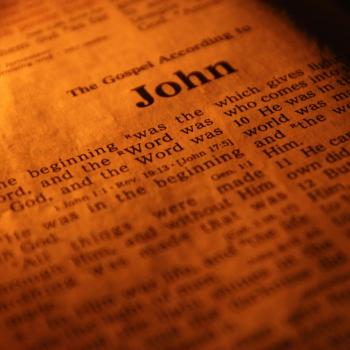Lectionary Reflections
Deuteronomy 18:15-20 (21-22)
February 1, 2015
This passage from Deuteronomy is rife with fascinating and complex thoughts concerning the proper evaluation of a prophet. Clearly, it has long been a huge problem in the lives of seriously religious people to know when persons who claim to be speaking on behalf of God are in fact speaking for God or are in reality speaking on behalf of "other gods," as Deuteronomy charges (Dt. 18:20). The book of Deuteronomy was apparently written sometime in the 8th/7th centuries B.C.E., but some 2700 years later we have the same problem: who speaks for God?
Our airwaves and pulpits are crammed with people who claim to speak for God, who call themselves, in effect, prophets. The word "prophet" in Hebrew is nabi', and its basic meaning in the language is "mouthpiece" or "spokesperson." Anyone who would put on the mantle of God claims to speak for God, and this is true whether or not one is a flaming fundamentalist or a creeping liberal; if God is called forth to affirm my words, however quietly or however blatantly, those words are announced as somehow words from God. All know that the words are streaming out of human mouths, are without doubt human words, but if the words are said to have a measure of divine relationship or divine sanction, then the person doing the speaking announces him/herself as prophet. Even when political speakers are wont to end their public addresses with that stock cliché, "God bless America" (a phrase I sincerely hope will one day pass away — soon), somehow that speaker has wrapped her/himself in the cloak of God.
But for all those who would not dare to speak for God, or who even have any sort of divine being in mind while they speak, just how are they to evaluate who is the one who really speaks for God? How can you know? Yesterday in the church I attend the preacher spoke of Jesus as a "migrant," who went to Egypt under the threat of Herod's murderous rage, and who along the way must have been aided in his flight from danger by any number of kind and generous souls, who opened their homes to the young couple and their infant, who shared food with them, and who kept them informed about the slaughter of the innocents in and around Jerusalem and Bethlehem. When the spasm of fury had abated, they were told it was safe to return, but it was made clear to them that Bethlehem was not finally the place they should return to, so they went north to Nazareth where Jesus grew up. The upshot of the sermon was that while murder and mayhem are always with us, so are the quieter gifts of kindness and hospitality to strangers. God is working in ways that are not ever, or seldom, in the headlines, and we too should join God in that work. I rather liked the sermon; it matched my own particular ways of thinking about the terrible passage from Matthew 2.
Down the street from my church there is a very large church of a very different denomination from the one I worship in, and though I do not know the subject of yesterday's sermon there, I can be certain that the sermon I heard was far from the one that was preached there. This is a church that has publically fulminated against gay persons as evil, has embraced rampant and rapacious capitalism as ordained of God, and has urged our government to send all "illegal aliens" back to the place of their origins, since they, as lawbreakers, are not welcome here. I seriously doubt whether the words "migrant" and "Jesus" were found together in any sermon on Matthew 2 or any other biblical passage. Well, who spoke for God yesterday? In one very simple sense that is what Deuteronomy 18 is about — who is a prophet of God?
Before we address that direct question, I need to say that Deuteronomy 18:15-22 has a very contentious scribal history, one that a simple reading of the NRSV's translation has at least partially hidden. At nearly every place where the NRSV reads "prophet," one subsequent translation or the other — Qumran, Septuagint, or other Hebrew manuscripts — read "prophets." Hence, the reason for the inclusion of this text in the lectionary for Epiphany 4, namely that Jesus is the expected "prophet like Moses," is called into question. Though it is true that the received text, what we have come to name MT (Massoretic text), has the singular "prophet" here, the decision to make that reading the accepted one is a complex decision, made over centuries by text critics. It seems to me that the plural reading is rather more realistic, as multiple persons over the centuries arose in Judaism to claim the role of prophet like Moses for the people. It, of course, serves a Christian reading if the prophet is singular, since Christians very early believed that Jesus was that promised prophet.
Okay, now back to the question of how a real prophet is to be found. I admit on first reading of Deuteronomy 18:18-22 to have found little help in an answer to that question. In fact, I confess to having publically ridiculed the response provided in these verses. In short, what I heard was something like: "If what a prophet says comes true, then she is a true prophet." Well, I said, thanks a lot! How can I finally know if what was said comes true? My crystal ball is ever cloudy, my Ouija Board never seems to move as it should, and Jeanne Dixon and Nostradamus are no longer with us to help us peer with confidence into the future. How in God's good name am I helped by that?





